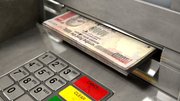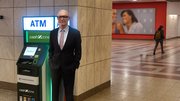Blog
Banks are still where the money is, but thieves are much more skilled
Today's thieves, however, are new-style bank robbers because they are technicians who can steal money from an ATM by adjusting the computer code, ordering the machine to dispense cash without anyone being the wiserat least for a while.
May 29, 2011
Willie Sutton, one of history’s most-prolific bank robbers, said he robbed banks because that’s where the money is.
Sutton and his fellow bank robber John Dillinger, who dramatically leapt over bank counters--at least in a movie starring actor Johnny Depp--before escaping in a waiting fast car, however, would be considered anachronisms today.
Their bank-robbing methods would attract too much attention. They stuck guns in bank employees’ faces before grabbing the loot. Sometimes shots were fired.The noise of the screeching tires and the smell of the burning rubber also would draw a crowd of innocent bystanders.
Banks are still where the money is and most of it is in ATMs. Modern bank robbers know it.
Today's thieves, however, are new-style bank robbers because they are technicians who can steal money from an ATM by adjusting the computer code, ordering the machine to dispense cash without anyone being the wiser—at least for a while.
The new brand of thieves or alleged thieves don't brandish guns. Most are employed in security positions by the banks or by companies hired by the bank to service their ATM fleets.
They don’t have criminal records, and they are solidly middle class.
They are not the type of guys who cops would make do the perp walk on television programs like "The First 48." And the criminals or alleged criminals elude detection for months or over a weekend before their employers even realize they have been hit hard.
Take for instance what recently happened in North Carolina and in the San Francisco Bay Area.
U.S. District Court Judge Frank D. Whitney, who sits on the bench in Charlotte, N. C., last week sentenced Rodney Reed Caverly, a 54-year-old Bank of America IT employee, to 27 months in a federal prison after Caverly pled guilty to stealing $284,750 from the BofA's ATMs over eight months. Caverly, who Charlotte, N.C.-based Bank of America hired to maintain and design computer systems utilized for conducting financial transactions at the bank's ATMs, installed malware in the bank's computer system.
"Caverly deployed a malicious computer code to Bank of America's protected computers and computerized ATMs for the purpose of causing the affected ATMs to make fraudulent and unauthorized disbursements of cash without any transactional computer record of the disbursements," Thomas A. O'Malley, assistant U.S. Attorney for the Western District of North Carolina, wrote in an April 1, 2010, court filing in the U.S. District Court in Charlotte.
According to court documents, the thefts occurred between March 20, 2009, and October 11, 2009.
In addition to being sentenced to prison, Caverly was ordered to repay Bank of America $419,310.90 in restitution. The amount includes the $284,750 Caverly admitted stealing from the bank. In addition, he must repay BofA $134,750.90, to remove the malware from the financial institution's ATM network.
About the same time, Caverly was learning where he would spend the next two plus years of his life, Samuel Kioskli, a 62-year-old former Diebold Inc. service technician, was spending his days and nights in the San Mateo, Calif., county jail, after Phoenix, police arrested him for stealing $180,000 in cash from seven Bank of America ATMs in Daly City, Calif., and San Francisco.
Kioskli allegedly used his service key to open the ATMs on July 4, 2010. He allegedly removed the cash, replacing the money with blank banknote-size strips of paper or badly printed counterfeit banknotes, said Joe Bocci, senior detective of the Daly City Police Department.
Diebold, which is based in North Canton, Ohio, has a contract to service Bank of America ATMs in the San Francisco Bay Area. Bank officials discovered the theft after the holiday weekend when the machines either dispensed blank paper or nothing at all. The ATMs' surveillance cameras filmed Kioskli removing the cash from the ATMs.
After the thefts, Kioskli fled to Arizona, where he was on the lam before being arrested in early May. In addition to stealing from Bank of America ATMs, Caverly and Kioskli have other things in common. They are highly skilled, and they had to successfully pass criminal background checks to get their jobs.
Bocci noted that Kioskli, who is facing commercial burglary, burglary, grand theft and embezzlement charges, did not have a criminal history.
Bocci, however, has a theory about what happened with Kioskli and what is generally occurring. "Given the economy, I think people are maxed out on their credit cards and over-their-heads in debt," he said. The U.S. Secret Service, which participated in the investigation of Kioskli, has not recovered any of the stolen money, Bocci said.
So the economy may be turning men without criminal records into thieves—just more sophisticated ones.
Included In This Story
Diebold Nixdorf
As a global technology leader and innovative services provider, Diebold Nixdorf delivers the solutions that enable financial institutions to improve efficiencies, protect assets and better serve consumers.













